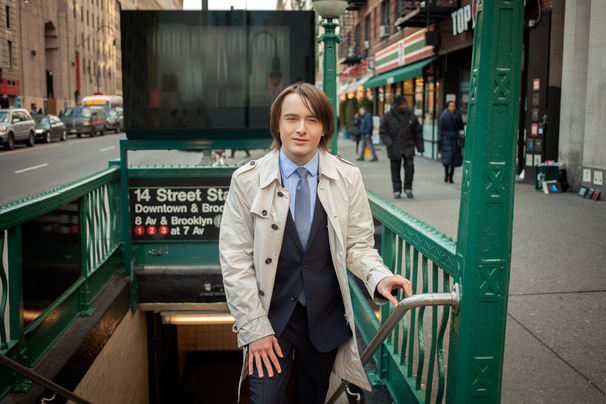After mixed start, Trifonov’s Liszt proves trancendental at Carnegie Hall
It should come as no surprise that Carnegie Hall was packed on Tuesday for Daniil Trifonov’s solo recital. Just twenty-three years old, the Russian pianist already commands as much star appeal as anyone on the concert scene.
Trifonov’s opening selection, Liszt’s transcription of Bach’s great Fantasia and Fuga for Organ in G minor, was anything but “historically informed.” His touch was elephantine, his rubato unrestrained. The late Christopher Hodgwood would likely have given him a good whack for this.
And that’s fine—this is Liszt-Bach, not Bach-Bach. But this piece just doesn’t work on the piano, or at least Trifonov’s interpretation did not persuade. The opening of the fantasia on organ has a beaming crispness that was lacking in this performance, and the expansive chords in the left hand were muddy. His treatment of the fuga was clear and straighter, but his hands were out of sync by just a hair, which in a complex Bach fuga is liable to drive a listener to distraction.
The pianist appeared to be more at home in Beethoven’s Op. 111 Sonata, even though the piano itself did not sound quite muscular enough to give the work its full, imposing effect. That complaint aside, the first movement was both intelligent and adventurous. In the Maestoso section Trifonov’s playing was smoky, stewing, and while his tempo was deliberate, it was never plodding or methodical. The allegro was certainly con brio, but beyond that it was almost ad libitum—at times, he was in danger of losing the music’s train of thought, but the manic, obsessive temperament in his playing kept it on track.
The Arietta, though, was off. Trifonov’s playing was simple and tender, but his tempo was slower than most, and too slow, frankly, to be cantabile, as Beethoven’s songlike indication instructs.
And then, more Liszt. To say that the second half played to Trifonov’s strengths would be an understatement. Here, at last, was the passionate virtuoso who dazzled a packed house in his first Carnegie Hall recital a year and a half ago. Beginning the Transcendental Études, his “Preludio” was swirling and suave, almost nonchalant in its showmanship, a wonderful teaser of things to come.
This was thrilling, jaw-dropping playing, and the highlights were many. He showed off stunning dexterity in “Mazeppa,” and his interpretation had a certain “cavalry dash” about it (odd, given that its subject is a young man tied to a horse as punishment, but convincing nonetheless).
There was an ethereal glow to “Feux follets,” as well as sparkling, impish wit. And the sheer power he was able to summon in some of these movements was astounding—forget the “Mannheim Rocket,” a few of Trifonov’s roaring crescendi had the thrust of a Boeing engine. But this was not all just bombastic, flashy Liszt—this was also sensitive and intelligent Liszt. The floating, blooming haze of “Ricordanza” was gorgeous to hear, almost making one believe there were a cello somewhere playing obbligato.
After teasing the audience by bowing tantalizingly close to the bench a few times, Trifonov finally acquiesced and played an encore. It was a rarity, “Alla reminiscenza” from Nikolai Medtner’s Forgotten Melodies I, gleaming and thoughtful, so soft you could hear the clicking of the keys. Nobody but nobody can make a keyboard whisper like Daniil Trifonov.








Posted Jun 02, 2015 at 9:59 pm by Andrew Dienes
Your review of the Beethoven Sonata was rather incomplete. Yes the Arietta was way too slow and so were the first few variations. But the tempo changed at the syncopated variation and there were wonderful moments in it as well as after. But the ending was also too slow. In my opinion a mixed bag, but deserved a more detailed review.
Posted Oct 29, 2015 at 4:34 am by Eirik Rø
I’ve must say that after listening to it the tempo really captured the essence of Beethoven’s composition. However, more important than tempo and technique is actually the emotions, feelings and the essence of the work which is given to us as listeners. Brilliant achievement by Trifonov, and so fresh performance.
Posted Jul 05, 2016 at 11:32 pm by Gloria Masters
I am 82 and have heard them all and met some of the best.
Daniil is a dazzling jewel amid the many gems. I hope to hear
and meet him in future.